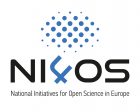The four-module Open Science e-learning course developed by KIFÜ (Governmental Agency for IT Development, Hungary) was launched early July, 2021, with an online workshop taking place on 13th July, 2021.

The e-learning course ‘Open Science and EOSC in practice’ has been developed by KIFÜ experts, and attempts to introduce pillars of Open Science to researchers and librarians. The course language is Hungarian, with the aim of reaching wider audiences. It can be completed with no prior knowledge on OS. All modules are escorted by a glossary and a brief introduction, and are richly illustrated with short videos, diagrams, quizzes, and other interactive tools.
Module 1 gives an insight into Open Science, talking about the Replication Crisis, introducing OS tools and possible ways on how to build those into the daily research routine. OS community building and requirements within Horizon Europe are also discussed..
Module 2 explains research data management requirements and FAIR principles. DMP tools that might help researchers to manage research data and meet funders’ requirements are discussed as well.
Module 3 addresses EOSC and how researchers and organisations might take part in this initiative. A timeline of EOSC is also presented that helps to learn about EOSC background and development phases.
EOSC services are introduced in Module 4 – both from the perspectives of researchers and service providers, with capture videos helping to navigate through EOSC Catalogue & Marketplace.
Opening the e-learning course for audience early July, was followed by an online workshop on 13th July, 2021. Around 40 people of 15 research institutions tested the e-learning course, and 33 of them attended the workshop. Attendees’ feedback praised the interactivity of the course and the rich illustrating materials. One attendee also added that ’it would be awesome if science could work in this [Open Science] way’.
Dr Tamás Máray, NI4OS-Hungary leader said:
’Having an e-learning course is a must in the era of online and hybrid education. Young researchers and librarians need to be more conscious about Open Science, and understand that the future of science must be open for all. This online course gives the possibility to approach audience in a more personal way by OS experts.’
